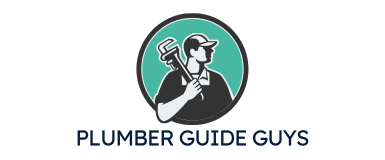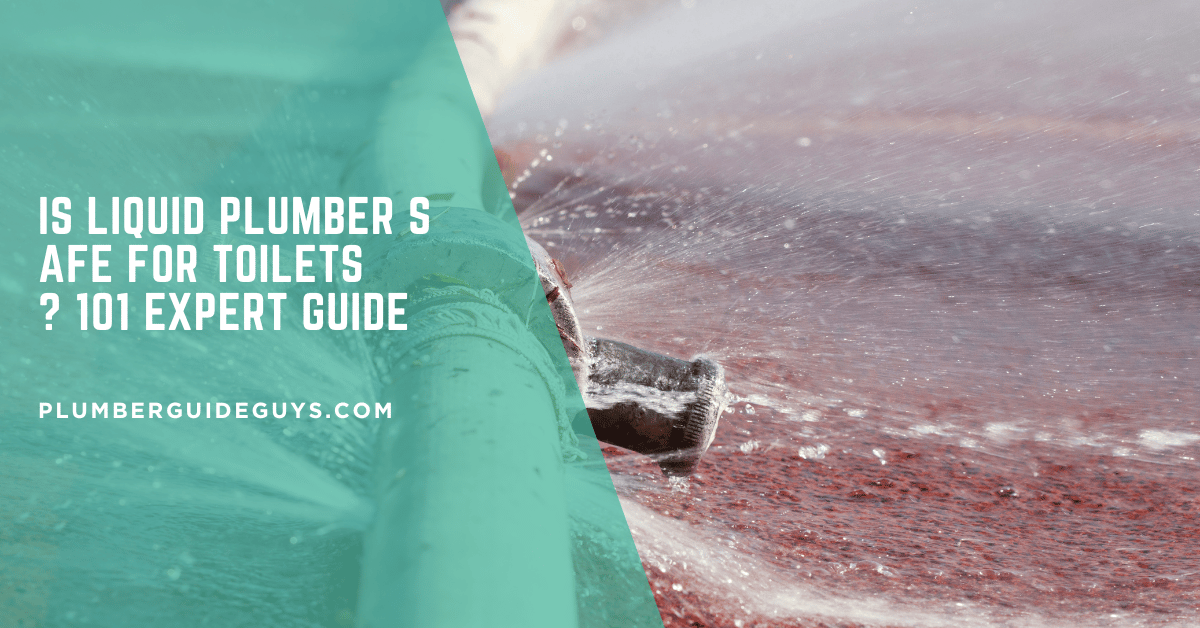Affiliate Disclosure
Plumber Guide Guys is a participant in the Amazon Services LLC Associates Program, an affiliate advertising program designed to provide a means for sites to earn advertising fees by advertising and linking to Amazon.
Is Liquid Plumber Safe for Toilets? Are you risking your home’s plumbing system with chemical drain cleaners? Many wonder about the safety of products like Liquid Plumber for toilet clogs. Knowing the risks of chemical cleaners can prevent expensive plumbing repairs.
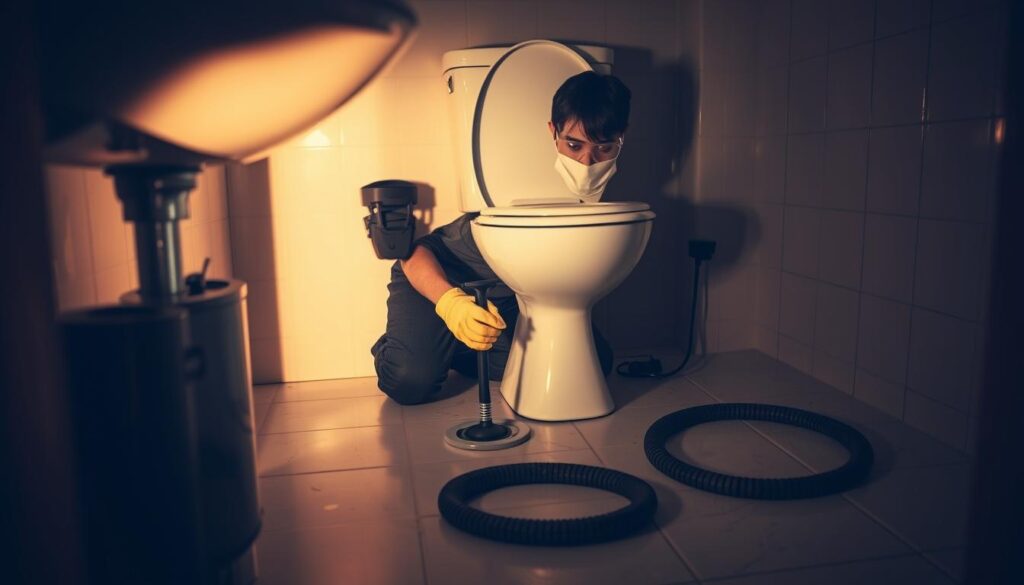
Chemical drain cleaners might seem like a quick solution for tough clogs. But they can seriously harm your pipes and septic system. The strong hydrochloric acid in these cleaners can damage your plumbing, leading to long-term issues.
Is Liquid Plumber safe for toilets? This guide will explore the risks, safer alternatives, and best practices for your plumbing system.
Key Takeaways
- Chemical drain cleaners can cause significant damage to plumbing pipes
- Not all clog removers are safe for toilet systems
- Natural alternatives exist for unclogging toilets
- Preventative maintenance is key to avoiding severe clogs
- Professional plumbers offer the safest clog removal solutions
Table of Contents
Understanding Toilet Clogs and Chemical Cleaners
Toilet clogs can really mess up your day. It’s important to know why they happen and how to fix them. When you’re dealing with tough clogs, picking the right cleaner is key.
Toilet blockages come from many sources. Knowing these can help you stop and fix problems better.
Common Causes of Toilet Clogs
- Excessive toilet paper usage
- Flushing non-biodegradable items
- Buildup of organic materials
- Tree root intrusion in underground pipes
- Mineral deposits in older plumbing systems
Types of Chemical Drain Cleaners
When looking at liquid plumber toilet effectiveness, you’ll find three main types of cleaners:
- Chemical Drain Cleaners: Sodium hydroxide-based solutions
- Acid Drain Cleaners: Sulfuric acid or hydrochloric acid formulations
- Oxidizing Drain Cleaners: Bleach and nitrate-based products
How Chemical Cleaners Work
Chemical drain cleaners work in different ways to clear clogs. They break down organic stuff, dissolve grease, and clear blockages. Knowing how they work helps you pick the best one for your toilet.
Pro Tip: Always read product labels carefully and follow manufacturer instructions to prevent pipe damage.
Each cleaner has its own benefits and risks. It’s important to choose the right one for your plumbing problem.
Is Liquid Plumber Safe for Toilets?
Chemical drain cleaners for toilets can be risky. They might solve clogs fast but could also harm your plumbing. It’s important to know the dangers of using liquid plumber compared to dealing with toilet clogs.
Chemical drain cleaners can damage your pipes. They have strong chemicals that can harm the materials in your pipes. This can lead to costly problems down the line.
- Potential pipe damage from repeated use
- Chemical erosion of pipe materials
- Risk of creating permanent plumbing problems
Your toilet’s plumbing is very sensitive. Chemical cleaners can weaken pipe walls, causing small cracks. These cracks can grow into big leaks over time. Plumbers often advise against using these harsh chemicals too often.
Not all drain cleaners are created equal – some are more damaging than others.
When facing a toilet clog, think about safer options. Tools like plungers or toilet augers are gentler and often work better. They don’t risk damaging your pipes.
Before using chemicals, check how bad the clog is. Often, simple tools can fix the problem without harming your plumbing. This way, you avoid the dangers of harsh chemicals.
The Impact of Chemical Cleaners on Plumbing Systems
Chemical drain cleaners can harm your home’s plumbing, causing damage that’s hard to see. It’s important to know the risks to prevent damage to your toilet’s plumbing.
Using harsh chemical cleaners can be dangerous for your pipes. These cleaners have strong chemicals that can damage pipe materials. This can lead to small weaknesses and possible pipe failures later on.
Effects on Different Pipe Materials
Different pipes react differently to chemical cleaners. Drain cleaner toilet instructions often don’t mention the specific dangers of each pipe type. Here’s how chemicals affect common pipes:
- PVC pipes: They can quickly break down and weaken.
- Metal pipes: They corrode faster and might get pinhole leaks.
- Older ceramic pipes: They can erode and lose strength.
Long-term Consequences
Using chemical cleaners often can lead to big problems. At first, it might seem like a small issue. But over time, these chemicals can:
- Make small cracks in pipe walls.
- Make pipes less durable.
- Make pipes more likely to fail without warning.
Risks to Septic Systems
Septic systems are very sensitive to chemical cleaners. These strong solutions can upset the balance of bacteria needed for waste breakdown. This can cause expensive problems with your septic system.
Keep your plumbing safe by using gentler, eco-friendly ways to clear clogs. This helps keep your pipes strong and your home’s plumbing system working well.
Safe Alternatives to Liquid Plumber
Chemical drain cleaners aren’t the only way to deal with a stubborn toilet clog. There are safe methods to clear blockages without harming your plumbing. Learning about these alternatives can save you money and keep your pipes safe.
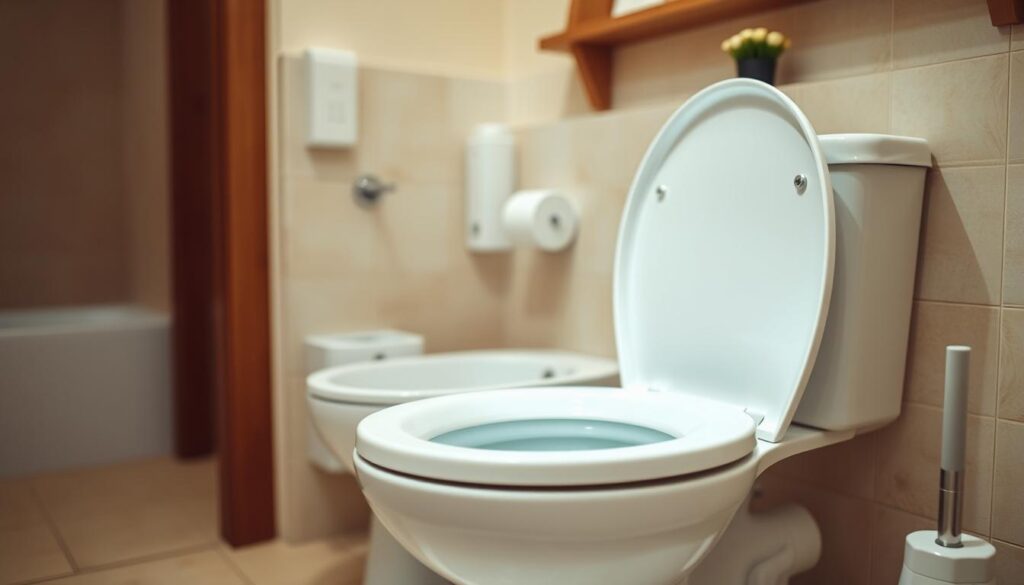
Your safety toolkit for toilet clogs should include several effective methods. These are gentle yet powerful. Here are some top alternatives to harsh chemical cleaners:
- Plunger Method: A classic and reliable approach for most minor clogs
- Toilet Auger: A specialized tool for reaching deeper blockages
- Hot water and dish soap technique
- Baking soda and vinegar solution
Professional plumbers suggest these safe methods first. The plunger is a quick fix for most clogs. For tougher issues, a toilet auger can clear blockages without chemicals.
When choosing a safe unclogging method, think about a few things:
- How bad the blockage is
- What’s causing the clog
- How comfortable you are with DIY fixes
- The risk to your plumbing
Choosing safe and gentle unclogging methods helps keep your toilet working well. It also protects your home’s plumbing system.
Natural Methods for Unclogging Toilets
Dealing with a clogged toilet can be frustrating. But, you don’t always need harsh chemical cleaners. Safe toilet unclogging methods can clear blockages without harming your plumbing. Natural solutions are gentle yet powerful, making them great alternatives to harsh chemicals.
Hot Water and Dish Soap Technique
This simple method can work wonders for minor clogs. Start by:
- Boiling a pot of water
- Adding a few drops of dish soap to the toilet bowl
- Slowly pouring the hot water from waist height
- Waiting 10-15 minutes before flushing
Baking Soda and Vinegar Solution
A classic toilet clog remover safety method uses household ingredients:
- Pour 1 cup of baking soda into the toilet bowl
- Slowly add 1 cup of white vinegar
- Let the mixture sit for 20 minutes
- Flush with hot water
Enzyme-Based Cleaners
For a more advanced natural approach, enzyme-based cleaners are an eco-friendly solution. These cleaners use beneficial bacteria to break down organic matter safely.
| Cleaner Type | Effectiveness | Environmental Impact |
|---|---|---|
| Enzyme Cleaners | High | Low (Eco-Friendly) |
| Chemical Drain Cleaners | Medium | High (Harmful) |
Pro tip: Always use safe toilet unclogging methods. This prevents damage to your plumbing system and protects the environment.
Professional Tools and Techniques
When home methods don’t work, professional plumbers have advanced tools to fix stubborn clogs. They use special equipment and know-how to handle tough plumbing problems. These issues are often beyond what you can solve at home.
Professional plumbers use several key tools for safe and effective unclogging:
- Professional-grade plumbing snakes
- Hydro-jetting equipment
- Video inspection cameras
- High-pressure water jetters
The most powerful tool in a plumber’s kit is the hydro-jetting system. It uses high-pressure water to clear tough blockages. This method cleans pipes without harming your plumbing system.
| Professional Tool | Effectiveness | Best Used For |
|---|---|---|
| Plumbing Snake | High | Minor to moderate clogs |
| Hydro-Jetting | Very High | Severe blockages and pipe cleaning |
| Video Inspection | Diagnostic | Identifying hidden pipe issues |
If you’re dealing with constant toilet clogs or slow drains, call a professional plumber. They can find and fix problems that home methods can’t. This keeps your plumbing system working well.
Prevention Tips and Maintenance
Keeping your toilet and plumbing system safe needs proactive care and smart maintenance. Start by understanding how to keep your bathroom fixtures in great shape. This way, you can avoid problems before they start.
Regular maintenance can greatly lower the chance of clogs and damage to your plumbing. When thinking about if liquid plumber is safe for toilets, prevention is key.
Regular Maintenance Practices
- Perform monthly drain inspections
- Use gentle cleaning tools and methods
- Check water pressure and flow regularly
- Clean toilet bowl and pipes with non-corrosive solutions
What Not to Flush
Being careful about what you flush is important for your plumbing. Some items can cause big clogs and damage.
- Avoid flushing:
- Feminine hygiene products
- Baby wipes
- Paper towels
- Cotton balls and swabs
- Dental floss
Early Warning Signs
Spotting plumbing problems early can save you money. Look out for these signs:
- Slow drainage
- Gurgling sounds
- Unusual odors
- Water backing up
- Frequent clogs
Pro tip: If you see these issues often, get a professional’s help before using chemicals. They might do more harm than good.
When to Call a Professional Plumber
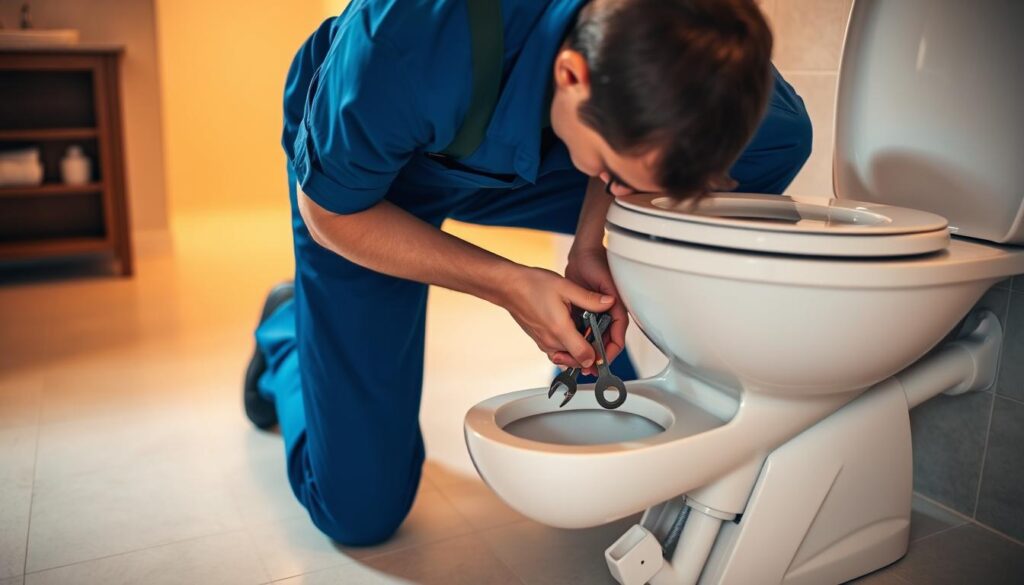
Knowing when to call a professional plumber is key to avoiding plumbing damage. Some problems are too big for DIY fixes and need a pro’s touch. Spotting the warning signs early can prevent expensive repairs and protect your home’s plumbing.
Here are times when you should call a professional plumber:
- Multiple drains are backing up at once
- Water shows up in places it shouldn’t, like sinks or showers when you flush
- Safe toilet unclogging methods don’t work
- You hear strange gurgling sounds from drains or toilets
- Sewage smells come from your drains
Some signs point to serious plumbing issues that need a pro. Water rising in multiple fixtures means a big blockage that could harm your plumbing. Plumbers have the tools and know-how to fix problems that are too risky for homeowners to tackle.
Trying to fix big plumbing problems without the right skills can lead to:
- Big pipe damage
- Possible sewage backups
- High repair costs
- Health risks from bad waste handling
Professional plumbers are experts in preventing plumbing damage. They do detailed checks, use advanced tools, and find lasting fixes to keep your plumbing safe.
Conclusion
Figuring out if liquid plumber is safe for your toilet needs careful thought. Chemical drain cleaners can harm your pipes and septic systems. It’s better to use gentle unclogging methods to keep your home’s plumbing safe.
Choosing safe ways to unclog your toilet is key to keeping your plumbing healthy. Tools like plungers and enzyme cleaners are better than harsh chemicals. They fix clogs without damaging your pipes.
Keeping your toilet flowing smoothly is easier with regular care. Use preventive steps and know what not to flush. This way, you can avoid big clogs. If you do get a clog, use safe methods to fix it.
Don’t hesitate to call a professional plumber if DIY fixes don’t work. They can help fix problems and keep your plumbing in top shape. Taking care of your plumbing is an investment in your home’s health.
